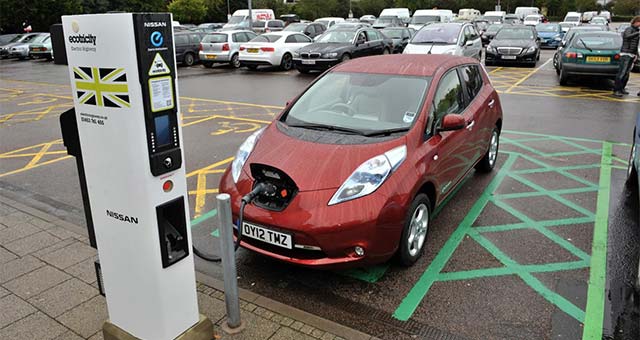Four cities across the UK are to receive new funding for the rollout of new infrastructure projects for ultra low emission vehicles (ULEVs) as the Department for Transport (DfT) continues to push the take-up of electric vehicles.
London, Milton Keynes, Bristol and Nottingham have been awarded funds from a £35 million pot under the Go Ultra Low City scheme, launched in December 2014 as a competition for UK cities to deliver a step-change in the uptake of ULEVs in those cities.
The winning cities were announced yesterday by transport secretary Patrick McLoughlin after a number of initiatives were proposed to support green vehicles.
“These Go Ultra Low Cities have proposed exciting, innovative ideas that will encourage drivers to choose an electric car. I want to see thousands more greener vehicles on our roads and I am proud to back this ambition with £40 million to help the UK become international pioneers of emission cutting technology,” he said.
London will receive £13 million from the scheme which will be used for a number of projects across the capital. Proposals include over a dozen streets in Hackney going electric with charging infrastructure such as car-charging street lighting, while Harrow will develop a low emission zone offering parking and traffic priority to owners of plug-in vehicles. ‘Neighbourhoods of the future’ will be created to prioritise ULEVs, with London’s full proposal aiming to deliver 70,000 ULEVs sold by 2020 and almost quarter of a million by 2025
Bristol will use its £7 million of funding to launch a range of initiatives designed to promote ULEVs, including the installation of over 80 rapid and fast chargers across the city. Residents will also be offered free residential parking if they use electric vehicles, as well as access to three carpool lanes in the city. A new scheme will also be launched to encourage people to lease a plug-in car for up to four weeks to help them better understand electric vehicles have to offer.
Milton Keynes was awarded £9 million for a city centre Electric Vehicle Experience Centre, which will provide consumer advice and short-term vehicles loans. All of the city’s 20,000 parking bays will also be made free to EVs, while bus lanes will be co-branded as low emission lanes.
Finally, £6 million of funding will be used to install 230 charge points across Nottinghamshire, with both Nottingham and Derby set to benefit from the funds. ULEV owners will also receive discounted parking rates and access to over 13 miles of bus lanes along key routes. The investment will also pay for a new business support programme letting local companies test electric vehicles before purchase.
Company car tax is already designed to incentivise the use of ULEVs, with significant tax reductions available to companies if they use zero-emission vehicles.
The Go Ultra Low City scheme is also providing £5 million of development funding for specific initiatives in Dundee, Oxford, York and north east regions. This includes new commuter charging hubs in Dundee and solar-canopied park and ride hubs in York that will help reduce air pollution in and around the city.
Poppy Welch, head of Go Ultra Low, said: “We’re excited to see the innovative ideas put forward by each of the winning Go Ultra Low Cities become reality over the coming months. The £40 million investment by government, combined with funds from each winning area, will transform the roads for residents in and around the 4 Go Ultra Low Cities.
“Initiatives such as customer experience centres, free parking, permission to drive in bus lanes and hundreds of new, convenient public charging locations are sure to appeal to drivers and inspire other cities and local authorities to invest in the electric revolution.”
The release of funds under the Go Ultra Low City forms part of the £600 million package of measures to be carried out by the Office for Low Emission Vehicles by 2020. This includes £400 million for the recently extended plug-in car grant scheme, as well as investment in low emission buses and taxis and research and development funding for new technology such as lighter vehicles and longer-lasting car batteries.
The UK is rapidly becoming a hub of activity in the electric vehicle sector, with the latest figures from the Society of Motor Manufacturers and Traders showing rapidly increasing sales among consumers. This is attracting significant investment from international manufacturers, with Nissan recently announcing a £26.5 million investment in its battery manufacturing facilities in Sunderland.
The UK government has pledged to ensure every new car and van in the UK is ultra-low emission by 2040.





